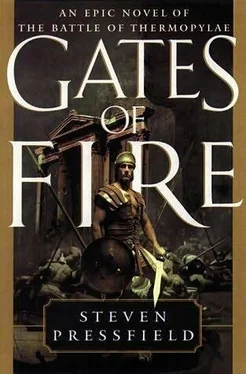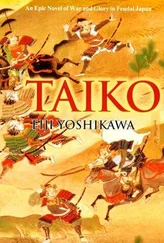Steven Pressfield - Gates of Fire - An Epic Novel of the Battle of Thermopylae
Здесь есть возможность читать онлайн «Steven Pressfield - Gates of Fire - An Epic Novel of the Battle of Thermopylae» весь текст электронной книги совершенно бесплатно (целиком полную версию без сокращений). В некоторых случаях можно слушать аудио, скачать через торрент в формате fb2 и присутствует краткое содержание. Жанр: Историческая проза, на английском языке. Описание произведения, (предисловие) а так же отзывы посетителей доступны на портале библиотеки ЛибКат.
- Название:Gates of Fire: An Epic Novel of the Battle of Thermopylae
- Автор:
- Жанр:
- Год:неизвестен
- ISBN:нет данных
- Рейтинг книги:3 / 5. Голосов: 1
-
Избранное:Добавить в избранное
- Отзывы:
-
Ваша оценка:
- 60
- 1
- 2
- 3
- 4
- 5
Gates of Fire: An Epic Novel of the Battle of Thermopylae: краткое содержание, описание и аннотация
Предлагаем к чтению аннотацию, описание, краткое содержание или предисловие (зависит от того, что написал сам автор книги «Gates of Fire: An Epic Novel of the Battle of Thermopylae»). Если вы не нашли необходимую информацию о книге — напишите в комментариях, мы постараемся отыскать её.
Gates of Fire: An Epic Novel of the Battle of Thermopylae — читать онлайн бесплатно полную книгу (весь текст) целиком
Ниже представлен текст книги, разбитый по страницам. Система сохранения места последней прочитанной страницы, позволяет с удобством читать онлайн бесплатно книгу «Gates of Fire: An Epic Novel of the Battle of Thermopylae», без необходимости каждый раз заново искать на чём Вы остановились. Поставьте закладку, и сможете в любой момент перейти на страницу, на которой закончили чтение.
Интервал:
Закладка:
At the height of that summer there was a war with the Antirhionians. Four of the army's twelve lochoi were mobilized (reinforced by elements of the Skiritai, the mountain rangers who comprised their own main-force regiment) to a call-up of the first ten age-classes, twenty-eight hundred in all. This was no force to be taken lightly, all-Lakedaemonian, commanded by the king himself; the battle train alone would be half a mile long. It would be the first full-scale campaign since the death of Kleomenes and the third in which Leoni-das would assume command as king, Polynikes would go as a Knight of the king's bodyguard, Olympieus with the Huntress battalion in the Wild Olive lochos and Dienekes as a platoon commander, an enomotarch, in the Herakles.
Even Dekton, my half-breed friend, would be mobilized as herd boy for the sacrificial beasts.
The entire Deukalion mess in which Alexandros stood-to, meaning acted as occasional cupbearer and server so he could observe his elders and learn, was called up except the five eldest men, between forty and sixty. For Alexandros, though he was six years too young to go, the mobilization seemed to plunge him even more deeply under his cloud. The uncalled-up Peers twitched about with their own brand of frustration. The air was touchy and ripe for explosiveness.
Somehow an all-in match got started one evening between Alexandros and me, outdoors behind the mess. The Peers gathered eagerly; the action was just what they needed. I could hear Dienekes' voice, cheering the brawl on. Alexandros seemed full of fire; we were bare-handed and his smallish fists flew fast as darts. He kicked me hard, to the temple, and followed with a solid elbow to the gut; I dropped. It was a true fall, I was really hurt, but the Peers had seen Alexandras' friends cover for him so frequently that they now thought I was tanking it.
Alexandros did too.
Get up, you outlander piece of shit! He straddled me in the dirt and hit me again when I rose.
For the first time I heard real killer instinct in his voice. The Peers heard it too and raised a shout of delight. Meanwhile the hounds, of whom there were never fewer than twenty after chow time, howled and bounded from every quarter in the turf-skimming fever that their masters' excited voices now drove them to.
I got up and hit Alexandros. I knew I could beat him easily, despite his crowd-impelled fury; I tried to pull my punch, just slightly so that no one would notice. They did. A howl of outrage rose from the Peers of the mess and others from adjacent syssitia, who had now clustered, forming a ring from which neither Alexandros nor I could escape.
Men's fists cuffed me hard about the ears. Fight him, you little fucker! The pack instinct had seized the hounds; they were at the verge of losing themselves to their animal nature. Suddenly two burst into the ring. One got in a nip at Alexandros before the men's sticks sent him scampering. That was it.
A spasm of the lungs seized Alexandros; his throat constricted, he began to choke. My punch hesitated. A three-foot switch burned my back. Hit him! I obeyed; Alexandros dropped to one knee. His lungs had frozen, he was helpless. Pound him, you whore's son! a voice shouted from behind me. Finish him! It was Dienekes.
His switch lashed me so hard it drove me to my knees. The delirium of voices overwhelmed the senses, all calling for me to polish Alexandros off. It was not anger at him. Nor were they rooting for me. The Peers could not have cared less about me. It was for him, to teach him, to make him eat the thousandth bitter lesson of the ten thousand more he would endure before they hardened him into the rock the city demanded and allowed him to take his place as an Equal and a warrior.
Alexandros knew it and rose with the fury of desperation, choking for breath; he charged like a boar. I felt the lash. I swung with everything I had.
Alexandros spun and dropped, face-first into the dirt, blood and spittle slinging from the side of his mouth.
He lay there, motionless as a dead man.
The Peers' shouting ceased instantly. Only the ungodly racket of the hounds continued at its maddening shrill pitch. Dienekes stepped across to the fallen form of his protege and knelt to feel his heart. In unconsciousness Alexandros' breath returned.
Dienekes' hand scraped the sputum from the boy's lips.
What are you gaping at! he barked at the circling Peers. It's over! Let him be!
The army marched out next morning for Antirhion. Leonidas strode at the fore, in full panoplia including slung shield, with his brow wreathed and his plumeless, unadorned helmet riding the rolled battle pack atop his scarlet cloak, his long steel-colored hair immaculately dressed and falling to his shoulders. About him marched the companion guard of the Knights, a half call-up, a hundred and fifty, with Polynikes in the forerank of honor beside six other Olympic victors. They marched not rigidly nor in grim silent lockstep, but at ease, talking and joking with one another and their families and friends along the roadside. Leonidas himself, were it not for his years and station of honor, could easily have been mistaken for a common infantryman, so unprepossessing was his armament, so nonchalant his demeanor. Yet all the city knew that this march-out, as the two previous beneath his command, was driven by his will and his will alone. It was aimed at the Persian invasion the king knew would come, perhaps not this year, perhaps not five years from now, but surely and inevitably.
The twin ports of Rhion and Antirhion commanded the western approach to the Gulf of Corinth.
This avenue threatened the Peloponnese and all of central Greece. Rhion, the near-side port, stood already within the Spartan hegemony; she was an ally. But Antirhion across the strait remained haughtily aloof, thinking herself beyond the reach of Lakedaemonian power. Leonidas meant to show her the error of her ways. He would bring her to heel and bottle up the gulf, protecting central Hellas from Persian sea assault, at least from the northwest.
Alexandras' father, Olympieus, marched past at the head of the Wild Olive regiment, with Meriones, the fifty-year-old battle captive and former Potidaean captain, beside him as his squire.
This gentle fellow possessed a grand beard, white as snow; he used to secrete little treasures within its bushy nest and pluck them forth, as surprise gifts, for Alexandras and his sisters when they were children. He did this now, straying to the roadside, to place in Alexandras' hand a tiny iron charm in the shape of a shield. Meriones clasped the boy's hand with a wink and moved on.
I stood in the crowd before the Hellenion with Alexandras and the other boys of the training platoons, the women and children, the whole city drawn up beneath the acacias and cypresses, singing the hymn to Castor, as the regiments trooped out along the Going-Away Street with their shields slung and spears at the slope, helmets lashed athwart the shoulders of their crimson cloaks, bobbing atop their polemothylakioi, the battle packs which the Peers bore now for show but which, like their armor, would be transferred, with all kit save spears and swords, to the shoulders of their squires when the army assumed column of march and stripped for the long, dusty hump north.
Alexandras' beautiful broken face remained a mask as Dienekes strode into view, flanked by his squire, Suicide, at the head of his platoon of the Herakles lochos. The main body of troops passed on. Leading and accompanying each regiment trudged the pack animals laden with the supplies of the commissariat and thwacked merrily on the rumps by the switches of their helot herd boys. The train of armament waggons passed next, already obscured within a churning storm of road dust; then followed the tall victualry waggons with their cargo of oil pots and wine jars, sacks of figs, olives, leeks, onions, pomegranates and the cooking pots and ladles swinging on hooks beneath them, banging into each other musically in the dust of the mules' tread, contributing a ringing metronomic air to the cacophony of cracking whips and squalling wheel rims, teamsters' bawls and groaning axles.
Читать дальшеИнтервал:
Закладка:
Похожие книги на «Gates of Fire: An Epic Novel of the Battle of Thermopylae»
Представляем Вашему вниманию похожие книги на «Gates of Fire: An Epic Novel of the Battle of Thermopylae» списком для выбора. Мы отобрали схожую по названию и смыслу литературу в надежде предоставить читателям больше вариантов отыскать новые, интересные, ещё непрочитанные произведения.
Обсуждение, отзывы о книге «Gates of Fire: An Epic Novel of the Battle of Thermopylae» и просто собственные мнения читателей. Оставьте ваши комментарии, напишите, что Вы думаете о произведении, его смысле или главных героях. Укажите что конкретно понравилось, а что нет, и почему Вы так считаете.












